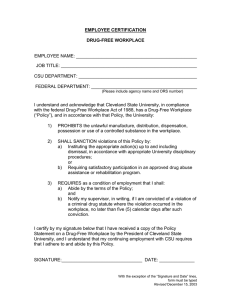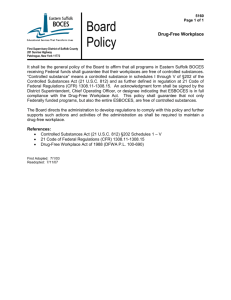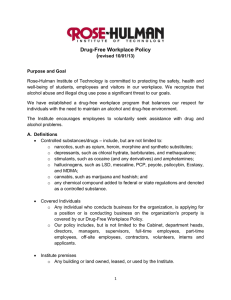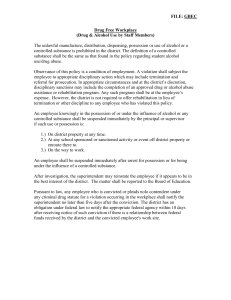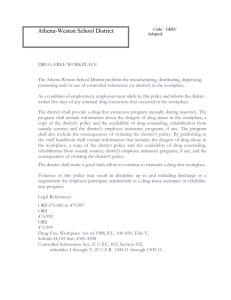Drug-Free Workplace Policy (
advertisement
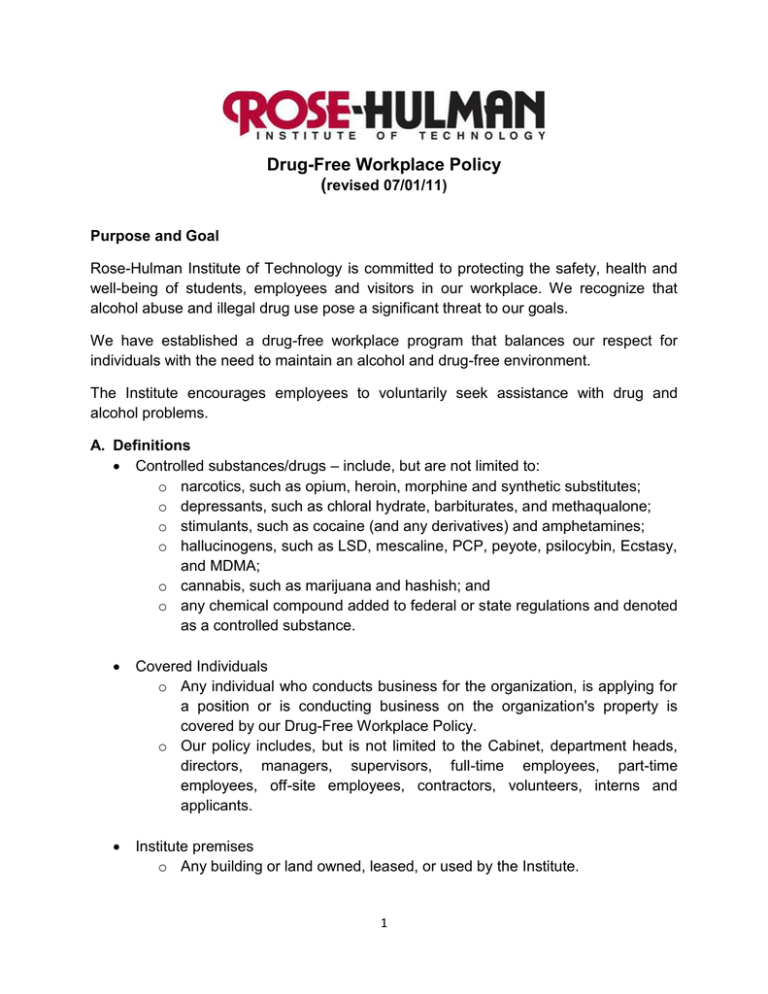
Drug-Free Workplace Policy (revised 07/01/11) Purpose and Goal Rose-Hulman Institute of Technology is committed to protecting the safety, health and well-being of students, employees and visitors in our workplace. We recognize that alcohol abuse and illegal drug use pose a significant threat to our goals. We have established a drug-free workplace program that balances our respect for individuals with the need to maintain an alcohol and drug-free environment. The Institute encourages employees to voluntarily seek assistance with drug and alcohol problems. A. Definitions Controlled substances/drugs – include, but are not limited to: o narcotics, such as opium, heroin, morphine and synthetic substitutes; o depressants, such as chloral hydrate, barbiturates, and methaqualone; o stimulants, such as cocaine (and any derivatives) and amphetamines; o hallucinogens, such as LSD, mescaline, PCP, peyote, psilocybin, Ecstasy, and MDMA; o cannabis, such as marijuana and hashish; and o any chemical compound added to federal or state regulations and denoted as a controlled substance. Covered Individuals o Any individual who conducts business for the organization, is applying for a position or is conducting business on the organization's property is covered by our Drug-Free Workplace Policy. o Our policy includes, but is not limited to the Cabinet, department heads, directors, managers, supervisors, full-time employees, part-time employees, off-site employees, contractors, volunteers, interns and applicants. Institute premises o Any building or land owned, leased, or used by the Institute. 1 Institute vehicle o Any vehicle owned, leased or operated by the Institute. Criminal drug statute conviction o When an employee is convicted of or pleads guilty to a drug statute conviction as defined by State or Federal Law. Testing for Reasonable Suspicion o Testing for a specific cause conducted immediately after there is significant evidence of using or being under the influence of drugs or alcohol while at work, (i.e.: aroma of alcohol on breath, exhibiting behavior markedly different from their normal behavior including symptoms normally associated with being under the influence, such as staggered gait, slurred speech, reddened eyes, unkempt look or extreme drowsiness or directly observed drinking alcohol (when unauthorized) or using drugs). B. Applicability Our Drug-Free Workplace Policy is intended to apply whenever a person is representing or conducting business for the Institute. Therefore, this policy applies during all working hours and while on call or paid standby. Prohibited Behavior It is a violation of our Drug-Free Workplace Policy for Institute employees and covered individuals to use, possess, sell, trade, and/or offer for sale alcohol, illegal drugs or intoxicants while on Institute premises; while conducting Institute business off campus or while driving Institute vehicles on or off-campus. Employees may not be at work under the influence of alcohol or while unlawfully using controlled substances. The consumption of alcohol at events where the Institute has authorized such use is permitted. Only individuals of legal drinking age may consume alcohol at these events. Prescription and over-the-counter medications are not prohibited when taken in standard dosage and/or according to a physician's prescription. Any employee or covered individuals taking prescribed or over-the-counter medications will be responsible for consulting the prescribing physician or pharmacist to ascertain whether the medication may interfere with safe performance of his/her job. If the use of a medication could compromise their safety or the safety of others, it is the employees and covered individuals responsibility to use appropriate Institute procedures, as applicable (i.e.: call in sick, use accrued leave time, request change of job duty or notify supervisor) to avoid unsafe workplace practices. 2 The illegal or unauthorized use of prescription drugs is prohibited. It is a violation of our Drug-Free Workplace Policy to intentionally misuse and/or abuse prescription medications. Appropriate disciplinary action will be taken if job performance deteriorates and/or other accidents occur. C. Notification of Office of Public Safety Any individual observed unlawfully manufacturing, distributing, dispensing, using, or possessing alcohol or illegal drugs on Institute premises is to be reported immediately to the Office of Public Safety. D. Shared Responsibility Office of Human Resources Responsibilities o The Institute will inform all employees of the Drug-Free Workplace Policy upon employment at New Employee Orientation and annually through usual employee communication mechanisms. o Provide access to training for supervisors and managers. o If notified that an employee may be under the influence, the supervisor will talk with, and observe, the employee to get the employee’s explanation of what is occurring. If there is a legitimate explanation for the behavior, then the supervisor may need to provide follow-up, especially if the reason is due to a medical issue such as diabetes. If there is no legitimate explanation, then the Director of Human Resources will make a determination on drug testing due to “reasonable suspicion.” o Refer and provide appropriate support for employees after drug testing and/or substance abuse treatment. Department Responsibilities o Supervisors with reasonable suspicion that a substance abuse problem may be resulting in unsatisfactory work performance should review those problems with the next level supervisor and the Director of Human Resources. Workplace performance issues should always be documented. o Take corrective action as appropriate after consultation with the Director of Human Resources. o When there is a suspension of responsibilities directly related to drug or alcohol use, upon authorization to return to work, an individual return-to-work agreement should be written in consultation with the Director of Human Resources. o Provide appropriate supervision for employees in accordance with return-towork agreements. 3 Employee and Other Covered Individuals Responsibilities o Employees and other covered individuals are expected to refrain from illegally using drugs or illegal substances at all times and refrain from being under the influence of alcohol while at work or representing the Institute. There may be special occasions where alcohol is being served on behalf of the Institute which would constitute an “authorized” event. If it is observed that the individual may be under the influence, by exhibiting symptoms such as staggered gait, slurred speech, reddened eyes, unkempt look or extreme drowsiness, then arrangements will be made to drive the individual home safely. o Report any dangerous behavior of the individual to the supervisor immediately. o Support co-workers and other covered individuals who are seeking assistance. E. Notification of Convictions Any employee who is convicted of a criminal drug violation in the workplace must notify the Institute in writing within five calendar days of the conviction. The Institute will take appropriate action within 30 days of notification. F. Consequences One of the goals of our drug-free workplace program is to encourage employees to voluntarily seek assistance with alcohol and/or drug problems. If, however, an individual violates the policy, the consequences are serious. In the case of applicants, if he or she violates the policy, the offer of employment may be withdrawn. The applicant may reapply after six months and must successfully pass a pre-employment drug test to be considered for employment. If an employee violates the policy, he or she may be subject to disciplinary action and may be required to enter a rehabilitation program. An employee required to enter a rehabilitation program but refuses to do so or fails to successfully complete the program, and/or repeatedly violates the policy, will be terminated from employment. This policy does not prohibit the employee from being disciplined or discharged for other violations and/or performance issues. G. Assistance Rose-Hulman Institute of Technology recognizes that alcohol and drug abuse and addiction are treatable illnesses. We also realize that early intervention and support 4 improve the success of rehabilitation. To support our employees, our Drug-Free Workplace Policy: Encourages employees to seek assistance if they are concerned that they or their family members may have a drug and/or alcohol problem. Encourages employees to utilize the services of qualified professionals in the community to assess the seriousness of suspected drug or alcohol problems and identify appropriate resources for assistance. Ensures the availability of a current list of qualified community professionals. Allows the use of accrued paid leave while seeking professional treatment. Allows for treatment of drug or alcohol issues through the Institute health insurance plan. However, the ultimate financial responsibility for recommended treatment belongs to the employee. H. Confidentiality All information received by the Institute through the drug-free workplace program is confidential communication. Access to this information is limited to those who have a legitimate need to know in compliance with relevant laws and management policies. 5
